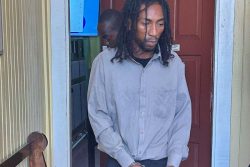We often ask people, “How are you?” Though, in many cases, we don’t really care about the answer. How many of us have that generic, “I’m fine” or I’m good” response always at the ready? We choose to not communicate how we are really feeling. And if those of us hurting did reveal that life is an unending nightmare, what difference would it make? How many have the time and the patience to sit and talk about the  dark places many visit in their minds? And for those who do share their problems, there is often that fear that the information would be divulged and used to devise tales about how hurt we are or who hurt us or how we are plotting or how we are dying. For protection, many of us must guard ourselves. But if we are brave enough to say what our problem is, it often elicits the advice to “Pray about it” or the assurance of “I will pray for you.”
dark places many visit in their minds? And for those who do share their problems, there is often that fear that the information would be divulged and used to devise tales about how hurt we are or who hurt us or how we are plotting or how we are dying. For protection, many of us must guard ourselves. But if we are brave enough to say what our problem is, it often elicits the advice to “Pray about it” or the assurance of “I will pray for you.”
Like the woman who seeks an audience with her religious leader and tells that her husband is beating her. Though she may be bruised, eyes tired from tears and grappling with low self-esteem; though she may explain how he displays his control; how the simplest disagreements could result in splatters of blood; how he tells her how to dress and who to talk to and where to go and when and what time to return; and how he threatens that if she ever leaves, he will kill her, the response is always the same.
We have recently seen the death of sixteen-year-old Parbattie Lakhpal, also known as Rosanna, who was murdered by her “reputed husband” because she left the relationship. Sixteen! An age where a young woman is supposed to be looking forward to the future she wants to have, having fun with friends and flirting with her crushes. How did she end up dead by the hands of an older man?
Was it the mother’s fault? Was it hers? Or was it the rage of a man-child too hurt to walk away from a young girl? Perhaps it was a combination of tragedies that led to the ultimate tragedy. We pray.
And there was also businesswoman Rhonda Blair, whose husband ended his own life after he murdered her. How many times do we feel despair when such events occur and we utter those familiar words: “Guyana needs prayers”? And so we pray.
Parbattie and Rhonda have joined the long list of Guyanese women murdered by their partners because parts of those men died long before the acts were committed. We cannot pray to raise those women from the dead and expect that it will happen. Yet many times when she reaches out, her hands are held and heads are bowed and supplications are offered and she is told, “Return home and try to work it out with your husband,” “Keep praying about it,” and “I will pray for you.”
And prayers are offered too for the man, emasculated or tortured by his failings and on the verge of jumping over the edge. Perhaps he has failed to financially secure himself or he cannot take care of a family or he has lost his virility. In an interview on the country’s suicide epidemic, I recently learned that many young men are becoming impotent. Alcohol abuse was identified as one of the factors. The pesticides they use on the produce they plant was another. There have been many cases where a wife would take a lover, leaving a husband feeling inadequate. In areas in Berbice and Essequibo, where the suicide rate has long passed the point of crisis, such situations are not uncommon. But, we will continue to pray for them.
And we pray too for the young people. Some are tormented by issues they feel unable to cope with. Monsters in our society are destroying many young people by committing sexual crimes against them and the violence against them that is normalised is often not seen as having long term consequences–even some who are educated utter words like “Blows mek I come good.”
But is it the same for everyone? Do we try to understand the mentality of the person who would allegedly rape a one-year-old, as was recently reported? Or the taxi driver in Linden who allegedly raped the twelve-year-old? Monsters do exist. Do we pray for them to change? Pray for the children to heal? Pray for the issues to disappear.
Young people are turning to drugs and alcohol. In an age where information is so easily accessible and exchanged, horridness is quite common and some of them cannot cope with the sometimes fast paced destruction of their reputations or the bullying or the gossiping or the judgment. Often, depression is unaddressed. Some of them resort to cutting themselves. Some complete suicides. But, we keep saying that we will pray, because sometimes I suppose it is the easiest response. Why rely on our strength to motivate change when many times we are battling our own terrors or just do not believe we possess the fortitude?
And what about the people and organisations that are there to help? The doctors, psychologists, counselors, religious leaders, safe places, and the hospitals. Are these not enough? Is the failing of some of these mechanisms so great that most of the people they are meant to reach are never reached? And when all else fails, will prayer really take care of it?
Guyanese are a very religious people. A majority would visit the churches, mosques and temples weekly. Even though many may stray from the fundamental principles of their religious beliefs, in times of hardship they turn to whoever or whatever they imagine their God to be. People will hold on to their faith and we must respect their choices.
But often what people need are not just words telling them to pray about whatever they are facing or that they will be prayed for. Often, what is needed is a helping hand. A shoulder to cry on.
A way out of a bad situation. A professional who is honest and concerned enough to delve deep and to help them work through their issues. Often, what we need is not to excuse those vile human beings by believing some miracle will happen if we simply pray for them but to see that justice is served. Our prayers must be accompanied by actions. Sure, there are cases where prayer is all that can be offered and they do bring comfort to some. But too often it seems that prayers are an excuse for our inability or unwillingness to face situations frontally. While many continue to wait on miracles, we also continue to witness the collapse of our society and week after week something else shocks us. We keep praying.








